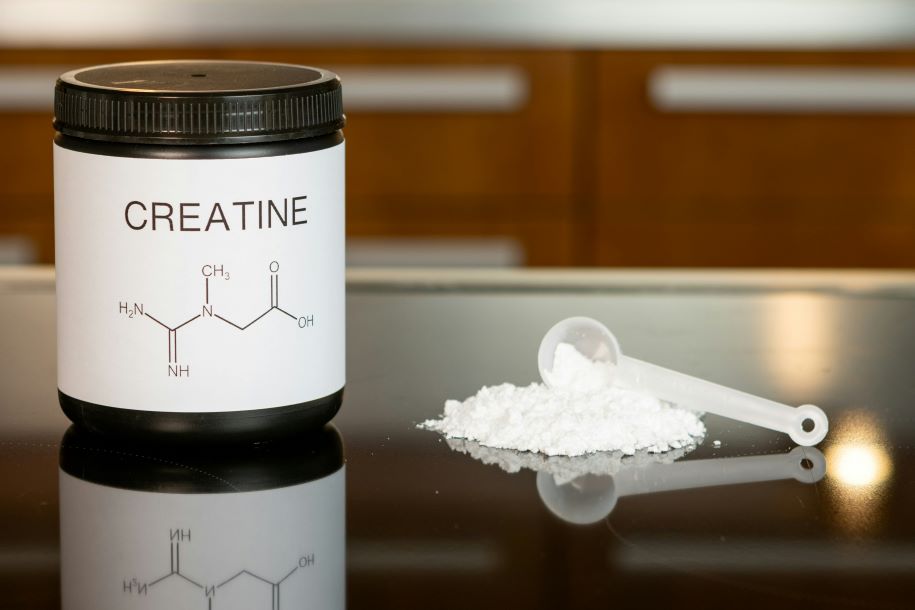
Creatine is an organic compound comprised of three amino acids that include glycine, arginine, and methionine. Mayo Clinic explains that it resides predominantly in your muscles and brain. 95% is stored in the skeletal muscle and 5% in the brain. The body’s liver, pancreas, and kidneys also make creatine.
So, what does creatine do? It serves as a quick energy source and supports the musculoskeletal system. It’s known to enhance power or promote bursts of speed, which is why many athletes focus on creatine monohydrate supplements. This power molecule plays a critical role in producing quick muscle contractions, especially during high-intensity, short-duration activities like sprinting or lifting heavy weights.
Mount Sinai states that not everyone’s body reacts to creatine in the same way, and it doesn’t always improve athletic performance for everyone. As far as when to take creatine, the data is inconclusive as there are various theories on that.
There’s a lot of chatter about creatine and whether women should take the supplement. As far as I can tell, there are a lot of benefits. I recently started taking 5 mg of creatine monohydrate by Thorne about 3-4 days per week. It’s tasteless and dissolves easily so I put it in my protein shake. The research is ongoing, but I’ll share what I’ve learned so far. Creatine supplements come in the form of powders, capsules, tablets, liquids, and energy bars. Some of the health benefits of creatine include:
Bone health – increased bone density
Muscle support – increased muscle strength and performance (helps with sarcopenia)
Brain function – enhanced cognitive performance particularly with memory and neuroprotective effects
Enhanced recovery – reduced injury risk
Weight management – improved energy and metabolism
Shortly after researching this topic, I started looking into the various food sources that contained creatine naturally to see which ones were currently supporting my diet. It appears that animal-based meat has the highest levels since creatine is stored in muscle tissue. Meat, seafood and animal milk seemed to make every list that I found. My daily meal plan consists of meat, but I question if I’m getting the essential amount for optimal muscle and brain function. Here is a list of some of the foods that are creatine sources (herring seemed to make the top of every list for the highest content):
Herring
Beef
Pork
Salmon
Tuna
Cod
Chicken
Breast milk
Cow’s milk
Goat’s milk
Cooking can reduce the level of creatine so it’s safe to say that raw meats and fish generally have higher concentration. These foods are still considered a good source of creatine even with diminished levels from cooking. Creatine is nearly absent in plant-based foods, so many people who follow a vegan or vegetarian diet may need to take a supplement. It’s best to ask a dietician or your doctor about this before you jump into supplements.
Science Direct mentioned a study that showed the average creatine intake to be 50% lower than anticipated in the US population. It could be that people are eating less meat, but I believe it has something to do with the American diet and the over-consumption of processed food that is lacking nutrients overall. 60% of the American diet comes from processed food (CDC), which is troublesome. This may be a key element in the deficiencies individuals are contending with.
Although most of the research has been done on athletes, studies are now aiming toward how creatine helps various illnesses. Research is showing the possibility that creatine is aiding with male and female reproductive health (NIH), but there needs to be more studies to confirm this. Medical News Today covers a list of illnesses that may benefit from creatine:
COPD
Congestive Heart Failure
Diabetes
Multiple Sclerosis
Parkinson’s
Fibromyalgia
Osteoarthritis
Creatine is normally well-tolerated for most people with low side effects. Many myths have been debunked over the years which are covered by the (NIH.) Some of the myths include whether creatine causes water retention, hair loss, kidney damage, dehydration, and muscle cramping. Following the recommended dosage will lead to less side effects as in any other medication or supplement.
Creatine is one of the most popular supplements in the US, especially for athletes. I’m guessing this is the case because of our ultra-competitive sports culture. Athletes are continuously looking for ways to gain an advantage and maintain their relevancy.
Our culture glorifies athletes from a young age and often places them on a pedestal. Many question whether kids should be taking the supplement, since most of the research is done on adults 18 years and older. The same NIH article goes on to say that children could also benefit from creatine.
In summary, creatine is a well-researched supplement that offers significant benefits for athletic performance, muscle growth, and recovery. Beyond its role in fitness, emerging studies suggest potential cognitive and health-related applications, broadening its appeal. While generally safe for most individuals when used appropriately, it’s essential to consider personal health conditions and consult a healthcare professional before starting supplementation. With proper use, creatine remains a valuable tool for enhancing both physical and mental performance.
Sign up for my monthly newsletter at the bottom of the home page of my blog or reach out anytime to Kim at nourishandflex@gmail.com and I will add you.

